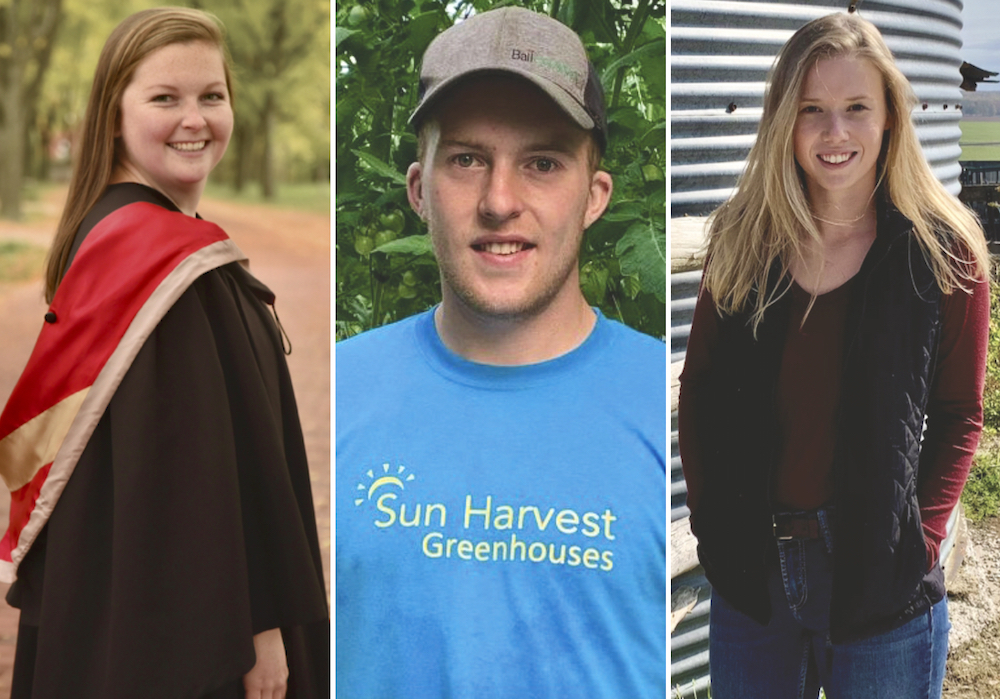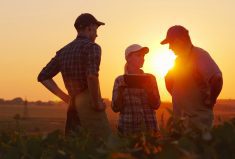In Canada’s colleges and universities, the last two years have seen unprecedented challenges coupled with myriad struggles to convert to virtual teaching. Few programs have been more impacted than agriculture, which relies on such an intense combination of classroom, lab, and field and barn training.
But was there a silver lining from “COVID-19?”
According to these new Ontario grads, the answer is “yes”, and “yes” again.
Read Also

How scientists are using DNA and climate data to breed crops of the future
A method for forecasting how crops will perform in different environments so that plant breeders can quickly select the best parents for new, climate-resilient varieties.
Monique Benedict
Bachelor of Commerce, Food and agricultural business
Kerwood, Ont.
Many grads get full-time jobs in finance, agronomy, animal health or another industry and then are involved on the family farm on evenings and weekends. Monique Benedict is one of them.
She comes from a third-generation egg and crop farm, Bencrest Farms Ltd., in Middlesex county. As the oldest of four sisters, she was the first to set her sights on post-secondary education in agriculture but knows she won’t be the last.
“We don’t know what the future structure of the farm will look like but I think all four of us will somehow be involved,” she predicts.
Because of COVID-19, Benedict completed her fourth year of studies from home and also virtually transitioned to her new role as a credit administrator in agriculture and commercial banking.
“We had to miss out on many traditional fourth-year activities,” she says. “But we didn’t miss out on job opportunities
Benedict says her generation is keen to use new technologies, like precision planting, to produce more food while becoming more efficient and more sustainable. That’s ultimately what both producers and consumers want, she says.
But it’s the consumer piece that has her worried. In fact, it’s a concern that our other grads voiced loudly, too. How can they educate the public on where their food comes from and encourage people to include farm products in their diets?
Benedict adds that social media puts all industries under a lens 24/7 but thinks agriculture is an easy target because food production has an impact on everyone.
“I’ve helped out with several public education events like Breakfast on the Farm,” says Benedict. “We need to continue to reach out to consumers, especially in large urban centres.”
Lindsay Forbes
Bachelor of Arts, Food agricultural and resource economics
Lion’s Head, Ont.
For Lindsay Forbes and many of her farming classmates, COVID-19 meant she learned more than she had expected. When all of her fourth-year classes went virtual, she split her time between rented student housing in Guelph and her family’s beef and crop farm two and a half hours north on the Bruce Peninsula.
“I was able to see aspects of our operation that I’ve never seen before because I’ve always been at school,” Forbes says. “I got more involved in calving and was given some tasks to manage because I could be available some days.”
While Forbes has always been keen to work in agriculture, the added exposure to day-to-day operations on the farm played a role in drawing her to join the business full-time after completing her degree.
Another factor in her decision was the opportunity to work with her grandpa, Harvey, whom she calls the farm’s best employee. The business he started in the 1950s, Harvey Forbes Livestock Ltd., has now grown to include his two sons, two daughters-in-law and two grandchildren full-time. Together they calve approximately 400 cows and background 1,200 steers from Alberta each year, in addition to growing corn, wheat and hay.
Although she wears many hats now, Forbes plans to focus on the beef aspect of the business in the future. This fall her goals include travelling west with her grandpa to meet ranchers, building skills in buying cattle and learning the appropriate management practices for when they arrive back in Ontario.
Kieran Shannon
Bachelor of Science, Agriculture in crop, horticultural and turfgrass sciences
Glenburnie, Ont.
Kieran Shannon, a fellow OAC Class of 2021 grad, shares Forbes’s outlook on the challenges of labour and increasing regulations.
His parents studied ag at Guelph too, but Shannon knows he is returning to a farm with new challenges. “Not that long ago people were content to start work at 5 a.m. and do farm chores but it seems like that labour pool is really shrinking,” he says. “It will continue to be an increasing challenge for my generation of farmers.”
But he also has a great sense of balance. Despite pandemic restrictions, he chose to spend his final year in Guelph to maximize his time with peer housemates.
Now he has joined the family business, Sun Harvest Greenhouses at Kingston, on a full-time basis after graduating last spring. “We grow hydroponic tomatoes and lettuce as well as ornamentals,” he says, noting the combination is relatively unique in the sector. The family sells to regional retailers, as well as through its own retail centre.
Shannon can’t hide his excitement and knows many of his classmates share the feeling. He believes Canada has a solid reputation for producing good quality commodities, which only strengthens opportunities to grow in both domestic and international markets.
“There is so much to look forward to,” he says. “The industry is constantly pushing for more efficiency and sophistication.”















